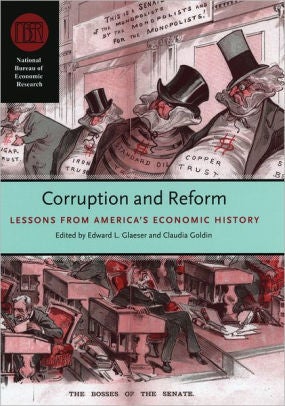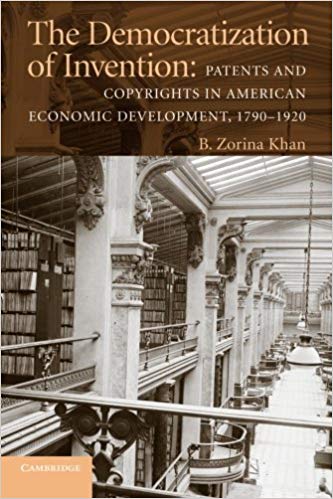Books
Corruption and Reform: Lessons from America’s Economic History
Corruption and Reform: Lessons from America’s Economic History, edited by Edward L.Glaeser and Claudia Goldin, is available from the University of Chicago Press. This NBER Conference Report may be purchased for $75.00 from: University of Chicago Press, Order Department, 11030 South Langley Avenue, Chicago, IL 60628-2215; 1-800-621-2736. Academic discounts are available.
Despite recent corporate scandals, the United States is among the world’s least corrupt nations. But in the nineteenth century, municipal governments and robber barons alike found new ways to steal from taxpayers and swindle investors. In Corruption and Reform, contributors explore this shadowy period of U. S. history in search of better methods of fighting corruption worldwide today.
The chapters in this volume address the measurement and consequences of fraud and corruption and the forces that ultimately led to their decline within the United States. They show that various approaches to reducing corruption, such as deregulation and in particular “free banking” in the 1830s, have met with success. In the 1930s, corruption was kept in check when new federal bureaucracies replaced local administrations in doling out relief. Another deterrent to corruption was the independent press, which kept a watchful eye over government and business. These and other facets of American history analyzed in this volume make it indispensable as background for anyone interested in corruption today.
Glaeser is a Research Associate in the NBER’s Programs on Aging, Law and Economics, and Economic Fluctuations and Growth. He is also the Fred and Eleanor Glimp Professor of Economics at Harvard’s Kennedy School of Government.
Goldin directs the NBER’s Program on the Development of the American Economy and is the Henry Lee Professor of Economics at Harvard.
The Democratization of Invention: Patents and Copyrights in American Economic Development, 1790-1920
The Democratization of Invention: Patents and Copyrights in American Economic Development, 1790-1920, by B. Zorina Khan, is available from Cambridge University Press for $60.00.
An examination of the evolution and impact of American intellectual property rights during the “long nineteenth century,” this monograph compares the American system to that of the more oligarchic societies of France and Britain. The United States created the first modern patent system and its policies toward inventors were the most liberal in the world. Individuals who did not have the resources to directly exploit their inventions benefited disproportionately from secure property rights and the operation of efficient markets. When markets expanded, these inventors contributed
to the proliferation of new technologies and improvements. In contrast to its leadership in the area of patents, the U.S. copyright regime was among the weakest in the world, in keeping with its utilitarian objective of promoting the general welfare. American patent and copyright institutions promoted a process of democratization that not only furthered economic and technological progress but also provided a conduit for the creativity and achievements of disadvantaged groups.
The topics discussed in this book, part of the NBER’s series on Long-Term Factors in Economic Development, include: patent laws and litigation; women inventors in America; patentees and married women’s property rights; and intellectual property and economic development.
Khan is a Faculty Research Fellow in the NBER’s Program on the Development of the American Economy and a member of the economics faculty at Bowdoin College. Orders for the book should be sent to the Press at: 100 Brook Hill Drive,West Nyack, NY 10994-2133. Or, by phone: 800-872-7423 (U.S. and Canada); 95-800-010-0200 (Mexico); or 845-353-7500.




